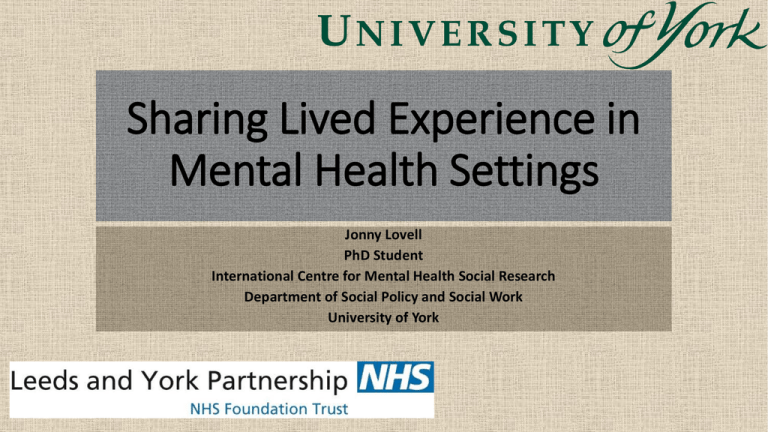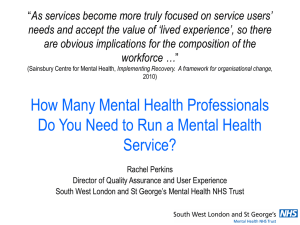
Sharing Lived Experience in
Mental Health Settings
Jonny Lovell
PhD Student
International Centre for Mental Health Social Research
Department of Social Policy and Social Work
University of York
Background
Career in voluntary sector since 1996 in variety of roles including:
• Sexual health and community development work with men who have sex with
men, and young men involved in selling sex (North and West Yorkshire). Genuine
occupational qualification for workers to be (a) men who have sex with men, and
(b) “out” about their sexual orientation
• Work with young people at risk on the streets (Manchester); project manager for
national children’s charity (Cornwall) providing community development services
for Sure Starts, and with Traveller communities; variety of other roles
• Returned to education to train as social worker in 2011, qualified in 2013
Social Work MA - 2012
• First placement instructed to hide my sexual orientation & if asked, deny it, because
clients may be homophobic, self-disclosure unprofessional, and dangerous – clients will
use information against you
• Research for MA dissertation: little written about self-disclosure in social work (more
within counselling); contentious - invokes strong feelings among practitioners
• Explored attitudes to different types of disclosure including:
Sexual orientation
Family structure
Religion/ethnicity
Mental health
Sharing Lived Experience
• Contacted by Recovery & Social Inclusion Worker at Leeds and York
Partnership NHS Foundation Trust (mental health trust) – want to
explore issue within mental health services
• Debate in the Trust about sharing “lived experience” of mental health
experiences and conditions by practitioners with service users
Sharing Lived Experience
SLE integral to the role of Peer Support Workers (a genuine occupational
requirement) – their status is known automatically by colleagues and service users
More controversy about wider practitioners – what is acceptable to share, when,
with whom, and why?
Anecdotal evidence suggests:
Some professionals share their lived experience
Many more professionals do not
Reasons for not sharing include: it is unprofessional, risky, and practitioners are
prevented from disclosing by their professional codes of practice/ethics
Peer Support Workers & Sharing Lived
Experience
2014 systematic review (Lloyd-Evans et al, 2014) suggests:
While there is debate about efficacy of peer mentor programmes and impact
on outcomes such as hospitalisation, readmission, quality of life etc.
evidence suggests peer mentor programmes can:
• Promote recovery
• Provide hope for the future
• Empower service users
Peer Support Workers and
Wider Practitioners
• Sharing lived experience is integral to the role of Peer Support Workers
(implicitly beneficial to the role)
• Is sharing lived experience only perceived as helpful if it is done by Peer
Support Workers?
• Might it be more or less helpful for wider practitioners to share their lived
experience too?
• How do practitioners and service users see the benefits of sharing lived
experience?
The research
• Partnership between the University of York and Leeds and York Partnership NHS
Foundation Trust
• Developed in collaboration with peer support service in consultation with service users
• Data collection to begin July 2014
• Multiple methods design:
• 1. Quantitative survey (ratings scales)
• 2. Qualitative survey (free-text boxes) and follow up focus groups
Survey: Practitioners & Service Users
3 main parts:
1.
Asks for examples of things that have been shared by a practitioner, and what
was helpful or unhelpful about them.
2.
Ratings: how helpful/unhelpful are different types of disclosure perceived to be?
Including: religion, physical health, mental health, sexual orientation, your family
circumstances, difficult or traumatic life experiences, and hobbies or out of
work activities.
3.
Ratings: how helpful/unhelpful is it for different practitioners to disclose?
Including doctors, nurses, peer support workers, psychologists, psychiatrists etc.
Free-text boxes enable respondents to explain why they answered the way they did.
Analysis & Focus Groups
Service users will be involved throughout the research including data
analysis
Emerging themes will be explored in:
• Practitioner Focus Groups
• Service User Focus Groups
Co-facilitated by
service users
Hypotheses
Ratings and views on the helpfulness of sharing lived experience will be
affected by:
• The job role of the disclosing practitioner
• The subject of the disclosure (i.e. what is being shared)
• The level of intimacy of the disclosure
• Whether the respondent is service user or a practitioner
International Partner
• Research mirrored in Melbourne, Australia
• Proposed collaboration between University of Melbourne, NorthWestern
Mental Health (Melbourne) and University of York
Will enable:
• Cultural comparison
• Wider perspective
Training and Guidance
Training and guidance for practitioners on sharing lived experience will be
produced, piloted and evaluated:
• In collaboration with service users and practitioners
• Incorporating feedback from survey and focus groups
• Including a short film of service users’ and practitioners’ views of sharing
lived experience
• Made available internally (LYPFT) and externally
Timescale
When
January-May 2014
What
Ethical approval (achieved) and pre-testing
June-September 2014
Data collection
October 2014 – February 2015 Data analysis;
Focus Groups
March – May 2015
Training and guidance development
June – August 2015
Pilot, evaluate and refine training and guidance
September 2015
Disseminate training and guidance
October 2015 – October 2016
Thesis write up and submission
Updates
Updates are being posted on
www.jonnylovellblog.wordpress.com
Relevant literature
Barker, T., Routley, B., Nettle, M. and Leech, F. 2011. The Case for a Formal Peer Support Service in Worcestershire. [On-line]. Available:
http://www.hacw.nhs.uk/EasysiteWeb/getresource.axd?AssetID=21244&type=Full&servicetype=Attachment [Accessed: 15.08.13]
Henretty, J. & Levitt, H. 2010. ‘The role of therapist self-disclosure in psychotherapy: A qualitative review.’ Clinical Psychology Review. 30 (1):
63-77.
Lloyd-Evans, B., Mayo-Wilson, E., Harrison, B., Istead, H., Brown, E., Pilling, S., Johnson, S., and Kendall, T. 2014. ‘A systematic review and
meta-analysis of randomised control trials of peer support for people with severe mental illness.’ BMC Psychiatry. 14:39.
Lovell, J. 2013. ‘Social Workers’ Attitudes towards Practitioner Self-Disclosure of Sexual Orientation with Clients’. Unpublished. York.
University of York.
McManus, S., Meltzer, H., Traolach, B., Bebbington, P. and Jenkins, R. (Eds). 2007. Adult psychiatric morbidity in England, 2007: Results of a
household survey. [On-line]. Available: https://catalogue.ic.nhs.uk/publications/mental-health/surveys/adul-psyc-morb-res-hou-sur-eng2007/adul-psyc-morb-res-hou-sur-eng-2007-rep.pdf [Accessed 20.08.13]
Reidy, H. and Webber, M. 2013. Edited by Rayner, S., Anthapoulos, S. and Doue, P. Evaluation of the Peer Support Scheme in Southwark. [Online]. Available: http://www.hacw.nhs.uk/EasysiteWeb/getresource.axd?AssetID=21244&type=Full&servicetype=Attachment [Accessed:
12.08.13]
Repper, J., & Carter, T. 2010. Using Personal Experiences To Support Others With Similar Difficulties. A Review Of The Literature On Peer
Support In Mental Health Services. London. Together and The University of Nottingham.
Singleton, N., Bumpstead R., O’Brien, M. , Lee, A. and Meltzer, H. 2000. Psychiatric morbidity among adults living in private households.
London. The Stationery Office.






